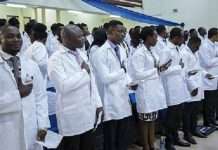Dr. Adenike Olaniba is the medical director, Olaniba Memorial Hospital, Surulere, Lagos, and national president, Healthcare Providers Association of Nigeria (HCPAN). In this exclusive interview with Adebayo Oladejo, the consultant public health physician spoke on the lingering crisis in the health sector. She also spoke on some issues relating to the National Health Insurance Scheme (NHIS), as well as the appointment of the Surgeon General of the Federation. Excerpts:
What were the objectives of HCPAN at the inception?
HCPAN is the umbrella body for all professional health groups that are participating in managed care and the National Health Insurance Scheme in Nigeria. The association was formed in compliance with Decree 35 of 1999 setting up the National Health Insurance Scheme (NHIS) with particular reference to Part 1, Section 11, Subsection 2 (g) and Part 11, Section 6 Subsection 2(d), enumerating the roles of health care providers in the country.
The association was established in August 2004 and was formally registered in 2005 with the Corporate Affairs Commission. So, it is a corporate body; a legally registered association. Membership of the association covers medical practitioners, dental practitioners, pharmacists, nurses and midwives, medical laboratory scientists, physiotherapist, radiographers and nutritionists, and their roles are enumerated in the Act.
Does it worry you that many public officials travel abroad for medical treatment?
Of course, it does worry us and we believe that health should be sourced for in Nigeria. However, it has been discovered that many of these people who travel abroad for treatment are attended to by Nigerian physicians who are based in those countries, especially the US and the UK. The belief is that we do not have basic infrastructure in Nigeria, which is why many of them travel abroad for treatment.
In a way, this is an indication that the Nigerian government has not paid enough attention to the development of our health sector, as there is insufficiency of trained personnel and inadequacy of medical facilities. So, until government pays attention to these, people will keep going to other countries to source for healthcare services.
However, it’s really a concern to those of us who are practising here. We believe that if the money they spend abroad could be invested in the nation’s health sector, we should have developed a better health system than what we have today.
Some healthcare providers have been calling for the removal of the health minister over claims that he is favouring medical doctors above others. What is your view on this?
I think that claim is a bit untrue. I am saying this because, in any country, especially countries that are running health insurance of any sort, medical doctors are always the first port of call. They are the primary physicians and any patient would naturally want to see them first. Traditionally, it is the doctor that refers patients to other healthcare providers, be it for diagnosis or for drugs.
In order to have a health system that follows the best practices, as forward in other countries, doctors must be the primary care personnel. That is the only way we can have an organised system. Although it is true that, in many countries, patients go first to the pharmacist, this is allowed because there are community pharmacists all over the place; and doctors themselves can go there for first-line drugs. I am happy that even here, in Nigeria, the jingles you hear on radio and television state that if you take a particular drug for three days, and you do not see any result, consult your doctor. This goes to confirm the role of the doctor in the health system.
So, for the health minister to place doctors as leaders of the health team is not out of order and it does not, in any way, mean that doctors are more important that other health care providers. The point he is making is that, in any team, there must be a leader and doctors will always be the leader of the health team, especially if that health team is to achieve the goal of providing qualitative healthcare to the masses.
How do we resolve the unending rivalry among healthcare practitioners in Nigeria?
The professional health group is a conglomerate of health practitioners, and if we all focus on the goal we are there to achieve, there will be no rivalry. The goal of the health system in any country is to provide qualitative healthcare for the citizenry. So, it doesn’t matter where the care is being provided or who provides it – the fact is that the care must be provided and the patient must be the focus of everybody in the healthcare team. Our concern should be on how to ensure that the patient gets qualitative healthcare.
To achieve this objective, we must agree among ourselves on where the patient should go first, and if we all agree that the first port of call should be the doctor, then we should allow them to lead the team. Since it is the provision of qualitative health care for the patient that we are all working towards, we should adopt the best practices that are prevalent in other advanced countries, so that our goal will be achieved at the end of the day.
As it is now, our health indices are so abysmal to the extent that our infant mortality rate, maternal mortality rate and others are below the average in the whole of Africa. So, we healthcare providers need to come together and close the gap. We should stop thinking about professional statuses and start focusing on the care we want to provide for the patients.
Incidentally, this issue of rivalry has caught the attention of the presidency and a committee has been set up to look into it. The committee is headed by the former Secretary to the Government of the Federation, Dr. Yayale Ahmed. Members of the committee include Prince Julius Adelusi-Adeluyi and Prof. Akinsete, among others.
The decision of the FG to appoint a Surgeon General of the Federation has been kicked against by some non-medical health practitioners. What is your reaction to this?
As far as the issue of Surgeon General is concerned, in the developed countries, the Surgeon General is appointed to take care of technical situations in government. For example, if a government official decides to go abroad for medical treatment, somebody has to advise the government whether that treatment should be funded by the resources of the government or not. So, the essence of all this is to conserve the revenues of the country, so that government officials do not spend frivolously on overseas medical treatment.
Before the government can sponsor any official on overseas treatment, somebody must sit down to analyse, investigate and advise the government whether that expenditure should be incurred or not. That’s majorly what the Surgeon General will be doing and, obviously, it is a medical doctor that will be in that office. His role is to advise the government; he has nothing to do with private individuals who want to travel abroad for medical purpose. So, I see no reason why anybody or group should kick against it, in as much as it’s in the interest of the country.
Will you pass vote of confidence on the NHIS?
The NHIS is a veritable means of health financing in Nigeria but the enabling Act that brought it into existence has some flaws. This is why we are calling for immediate review and overhaul of the Act.
For example, there is a clause in the Act that makes it optional for Nigerians to have health insurance. We believe that the clause should be reviewed and every Nigerian must have a form of health insurance, instead. Once that clause is reviewed, it gives NHIS the ability to apply health insurance to all Nigerians. I think this is the major handicap that NHIS currently has.
Nevertheless, it is encouraging that the NHIS has been able to provide qualitative healthcare to members of the federal civil service, pregnant women, and children under the age of five; but this is still a meagre percentage of the population. About 95 percent of the population is in the informal sector, and this is why some people are scoring the NHIS low in performance because the vulnerable groups and the indigents are still there in the dark, and they need to be catered for.
Where do you hope to see HCPAN in the next five years and what message do you have for your members nationwide?
In the next five years, we hope that HCPAN, as recognised in the NHIS Act 35 of 1999, will be the major association under which all other healthcare professional associations will be operating the health insurance. This however does not mean that we are taking over the roles of individuals and professional health groups, as our own focus is on health insurance.
So, we are hoping that, in the next five years, all health facilities that are providing health insurance in the country will come under the HCPAN umbrella. This is necessary, so that we can regulate ourselves and be able to impart adequate knowledge in the implementation of health insurance in Nigeria.
To my members, I wish to say that, as healthcare providers, we must work together to ensure we achieve the goal of qualitative healthcare at affordable cost. Let us look at Nigeria as being able to achieve universal health coverage by the end of 2015 because we all know that 2015 is close. Let us join hands towards that goal.











tadalafil generic date – tadalafil canadian pharmacy tadalafil 5mg